|
|
|
Sort Order |
|
|
|
Items / Page
|
|
|
|
|
|
|
| Srl | Item |
| 1 |
ID:
123888
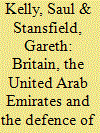

|
|
|
|
|
| Publication |
2013.
|
| Summary/Abstract |
This article investigates the deepening of the UK's security and defence arrangements with the United Arab Emirates (UAE).
In recent years there has been a flurry of diplomatic activity indicating far closer engagement between London and Abu Dhabi. Rather than being an innovative initiative of the Cameron government, the interaction has deeper roots, with this article uncovering the importance of the relatively unknown Defence Cooperation Agreement (DCA) of 1996, signed by the Major government. Furthermore, the UK-UAE defence relationship is shown to have endured beyond the infamous UK withdrawal from 'east of Suez' in 1971.
The current engagement is, however, more intense and potentially far-reaching than it had been in recent decades, with the defence sector being placed at the forefront of UK efforts to bolster the relationship with the oil-rich Gulf emirate.
Using official statements from London and Abu Dhabi, this article suggests that the UK-UAE relationship has always remained intact, although it lost focus following the end of the Major government until the refocusing on the Gulf by the Cameron government. The article concludes with an assessment of the expectations of the UAE, and the strategic drivers underpinning UK policy.
|
|
|
|
|
|
|
|
|
|
|
|
|
|
|
|
| 2 |
ID:
145940
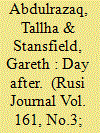

|
|
|
|
|
| Summary/Abstract |
Over recent months, the Islamic State (IS) in Syria and Iraq has lost territory to the Syrian army, opposition forces in Syria, the reorganised Iraqi Security Forces and the Hashed Al-Sha’bi (Popular Mobilization Forces – PMF), as well as to Kurdish Peshmerga forces in Iraq. These losses have led to heightened speculation that an assault on the IS stronghold of Mosul may happen sooner rather than later. However, with such speculation comes the fear of ‘the day after’, and what could be expected to happen in Mosul – a traditional focal point of Arab and Iraqi nationalists – and a city that was the centre of Iraq’s military establishment throughout the twentieth century. Tallha Abdulrazaq and Gareth Stansfield investigate this ‘day after’ question, highlighting the potential problems that may emerge following IS’s departure from the city.
|
|
|
|
|
|
|
|
|
|
|
|
|
|
|
|
| 3 |
ID:
148178


|
|
|
|
|
| Summary/Abstract |
Using eyewitness accounts, this article tells the story of the 2014 conquest of Mosul by the Islamic State in Iraq and al-Sham (ISIS). The organization's rise is placed within historic context, examining events in Mosul dating back to the US-led invasion of 2003 and assessing the impact of Iraq's sectarian policies. The failure to appreciate these long-term developments has hindered understanding of ISIS, despite the enormous media attention the group receives.
|
|
|
|
|
|
|
|
|
|
|
|
|
|
|
|
| 4 |
ID:
067083
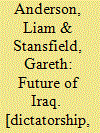

|
|
|
|
|
| Publication |
Hampshire, Palgrave Macmillan, 2004.
|
| Description |
ix, 278p.pbk
|
| Standard Number |
1403971447
|
|
|
|
|
|
|
|
|
|
|
|
Copies: C:1/I:0,R:0,Q:0
Circulation
| Accession# | Call# | Current Location | Status | Policy | Location |
| 050446 | 956.70443/AND 050446 | Main | On Shelf | General | |
|
|
|
|
| 5 |
ID:
153205


|
|
|
|
|
| Edition |
2nd ed.
|
| Publication |
Cambridge, Polity Press, 2016.
|
| Description |
xviii, 327p.: mapspbk
|
| Series |
Global Politics Series
|
| Standard Number |
9780745649290
|
|
|
|
|
|
|
|
|
|
|
|
Copies: C:1/I:0,R:0,Q:0
Circulation
| Accession# | Call# | Current Location | Status | Policy | Location |
| 059099 | 956.70443/STA 059099 | Main | On Shelf | General | |
|
|
|
|
| 6 |
ID:
132994
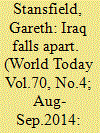

|
|
|
|
|
| Publication |
2014.
|
| Summary/Abstract |
The political and social environment among the Sunni rebels was primed for insurgency by 2013, if not before.
|
|
|
|
|
|
|
|
|
|
|
|
|
|
|
|
| 7 |
ID:
135869


|
|
|
|
|
| Summary/Abstract |
The fall of Mosul in June of 2014 was followed in July by the establishment of a self-proclaimed Caliphate by the Islamic State of Abu Bakr al-Baghdadi. Since then, the Islamic State has continued to expand its operations, persistently pushing into Sunni-dominated parts of Iraq and Syria, nearly defeating the Kurds of Iraq, and moving against the Kurds of Syria, in Kobani, as well as army units of the Syrian state. By doing so, it has maintained an astonishingly high tempo of operations and has shown itself capable, agile and resilient. It has also proved itself to be adept at utilizing social media outlets, and in pursuing brutal tactics against civilians and prisoners that have been aimed at shocking adversaries—potential or actual—and observers both in the region and beyond. The rise of the Islamic State poses a challenge not only to the security of Iraq and Syria, but to the state system of the Middle East. Western powers have been drawn into a conflict in a limited fashion—through air strikes and advising ground forces; the UK, while engaging slightly later than other countries against the Islamic State, has followed this pattern, though targeting Islamic State forces solely in Iraq. This article considers the nature and scale of the threat posed by the Islamic State, and assesses three possible areas of further policy engagement that they UK may, or may have to, follow.
|
|
|
|
|
|
|
|
|
|
|
|
|
|
|
|
| 8 |
ID:
183750
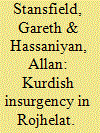

|
|
|
|
|
| Summary/Abstract |
This article sheds light on recent political developments in Rojhelat (Eastern/Iranian Kurdistan), focusing on the activities of Rojhelat’s leading political parties. This study argues that the existing situation in the area is a product mainly of the shift in Rojhelat’s mainstream political organisation, the Kurdistan Democratic Party of Iran, in its political and military approach to the Kurdish movement in Iran, popularly known as Rasan-i Rojhelat (the revival/sudden rise of Eastern Kurdistan). This has triggered a new, high level of conflict between Kurds and the Islamic Republic of Iran since 2015. Since the announcement of the Rasan, tit-for-tat clashes between Kurdish Peshmerga/guerrilla units and the Islamic Revolutionary Guards Corps (IRGC) have been witnessed across Rojhelat. Analysis of the Kurdish question in Rojhelat reveals this development as multifaceted and complex, involving multiple actors and activities such as insurgency and collective protest from Kurdish civil society. This article focuses on two main developments: the methods and practices deployed by the Kurdish political parties of Rojhelat following the Rasan, and the sudden announcement of negotiations between representatives of the Iranian government and of four of Rojhelat’s political parties from 27-28 July 2019 in Oslo.
|
|
|
|
|
|
|
|
|
|
|
|
|
|
|
|
| 9 |
ID:
087382


|
|
|
| 10 |
ID:
099897


|
|
|
|
|
| Publication |
2010.
|
| Summary/Abstract |
The withdrawal of US combat forces presents new challenges and opportunities for Iraqis over the coming months and years. This special issue of International Affairs seeks to provide an assessment and analysis of many of these challenges and opportunities from the perspective of Iraqi actors, while also considering the interests of the wider regional and international community. Iraq remains important, fundamentally so. The main challenges that now face Iraqi leaders are not of recent origin but have never been fully confronted-to some degree the US presence has acted to ameliorate tensions at difficult times and helped to find compromise solutions that have left situations calm but also put on hold. The articles in this special issue focus on a range of these challenges, questioning orthodox views on Iraqi political development and considering the possibilities that lie ahead. They present not only 'post-American Iraq' but also 'post-Iraq America'. By facing these challenges successfully, political, economic and social opportunities clearly unfold. These opportunities, if exploited to the full, would see Iraq's security become normalized, its economy and social structures repaired, and the prominence of the country in international affairs as a constructive rather than destructive force increased. However, the reverse of this is also starkly apparent. The failure of Iraqi leaders to meet the challenges may present very serious problems in the near future-problems possibly made all the more severe due to the lack of a US military presence and the perceived weakening of US will to impose itself on the political direction of the country.
|
|
|
|
|
|
|
|
|
|
|
|
|
|
|
|
| 11 |
ID:
094615
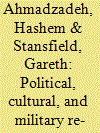

|
|
|
|
|
| Publication |
2010.
|
| Summary/Abstract |
This article aims to shed light on the modern history of the Kurds in Iran, with particular reference made to the main Kurdish political and social movements of the 20th century following World War I and the establishment of an Iranian nation-state. The modernization and centralization of the new state deprived the non-Persian ethnic groups, including the Kurds, of democratically expressing their national aspirations. The consequences of this policy and the struggle of the Kurds against it throughout the remainder of the century and up to the present are the main issues discussed in this article.
|
|
|
|
|
|
|
|
|
|
|
|
|
|
|
|
| 12 |
ID:
099906


|
|
|
|
|
| Publication |
2010.
|
| Summary/Abstract |
Iraq has not enjoyed regular foreign relations since 2003, and arguably for several years before. Looking ahead, Iraq is now in a position to develop its foreign relations fully, yet how these relations will be constructed remains unclear. As with all states, Iraq's foreign policy remains conditioned by geopolitical factors- and in particular control of resources, access to waterways, and its geographical location between the Arab world, Turkey, and Iran. There are also the legacies of the Ba'athist regime to consider-and especially the way foreign policy was constructed, and how 'foreign' was defined in terms of foreign to the regime, rather than to Iraq. Layered on top of these geopolitical determinants and legacies is the reality of the post-2003 state. With the removal of the structures of the Ba'athist regime and the emergence of new political elites under the guidance of the US, Iraq's foreign relations are now clearly different, yet some of the patterns of the past still remain very much in place.
|
|
|
|
|
|
|
|
|
|
|
|
|
|
|
|
| 13 |
ID:
119445


|
|
|
|
|
| Publication |
2013.
|
| Summary/Abstract |
Ten years after regime change in Iraq, the Kurdistan Region has emerged as a transformative force in the international affairs of the Middle East. The Kurds have moved to being architects of the new Iraqi state, but have thereby forced an ideational contest between them - as visionaries of a decentralized Iraq - and successive Iraqi governments that favour a centralized authority structure.
In addition to this first set of developments, the prominence of the Kurds is also explained by two additional sets of issues. The second concerns the interplay of federalism in Iraq and the management of the country's oil and gas reserves. Kurdistan's expansion of its hydrocarbons industry has been met with opposition from Baghdad that has furthered the polarization and enmity between the two sides.
The third issue, which serves to make concrete the gains made by the Kurds, concerns regional geopolitical developments. For the first time in a century, the nationalist interests of the Kurds in Iraq are compatible with the sectarian interests of Turkey and Sunni Arab states.
These three issues (domestic development, economic advancement and regional geopolitics) come together to explain the Kurdistan Region's agency in a rapidly transforming regional complex and raise the possibility of an independent Republic of Kurdistan emerging in the near future as an idea that is no longer regarded as impossible.
|
|
|
|
|
|
|
|
|
|
|
|
|
|
|
|
|
|
|
|
|